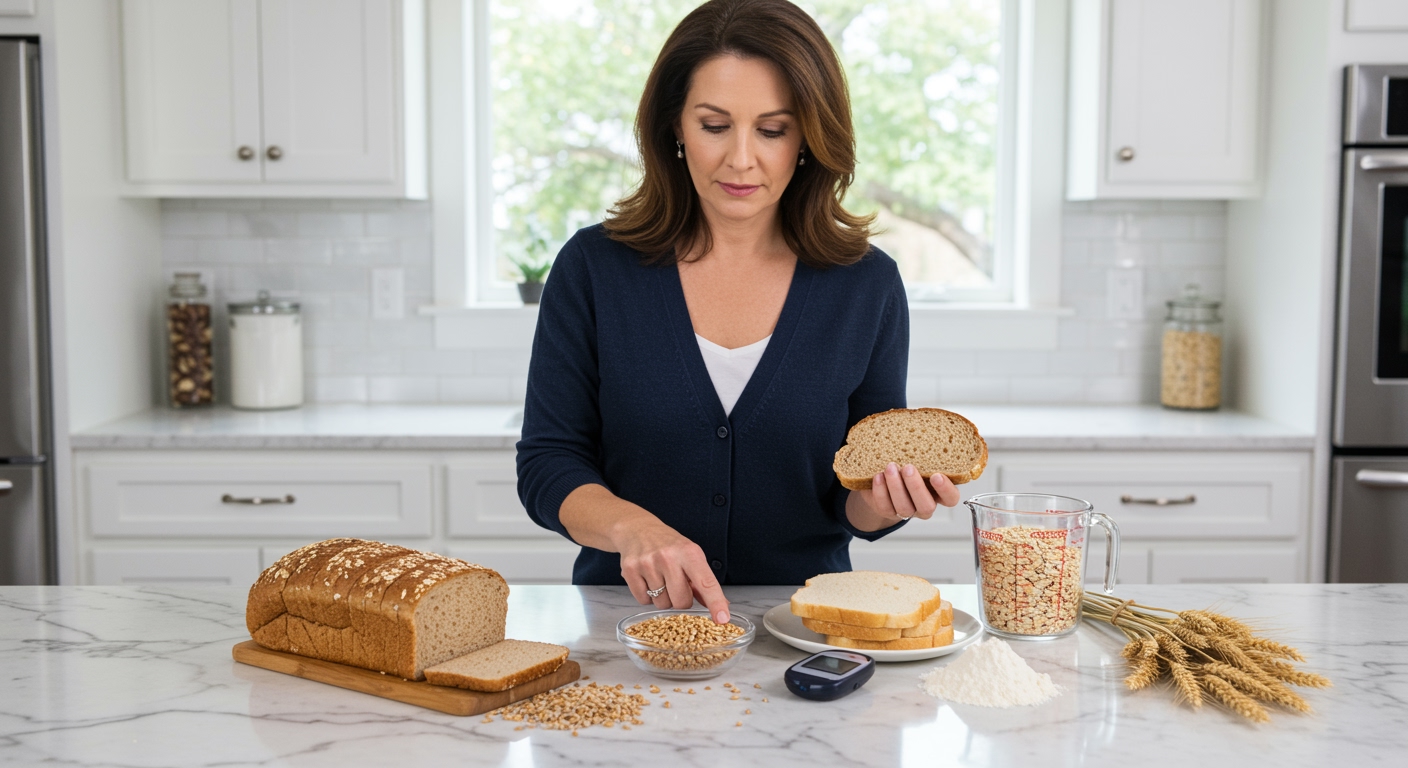✪ Key Takeaway: Whole wheat can be part of a diabetes diet when eaten in proper portions and combined with protein or healthy fats.
Introduction
Your doctor just told you that you have diabetes, and suddenly wheat feels like your enemy.
You might be wondering if you need to give up bread, pasta, and all your favorite wheat-based foods forever.
Hi, I’m Abdur, your nutrition coach, and today I’m going to explain exactly how wheat affects your blood sugar and which types you can still enjoy safely.
How Does Wheat Affect Blood Sugar Levels?
Wheat contains carbohydrates that break down into glucose in your digestive system.
When you eat wheat products, your blood sugar rises as these carbohydrates enter your bloodstream.
The speed and intensity of this blood sugar rise depends on the type of wheat product you choose.
Refined wheat products like white bread cause rapid spikes because the fiber has been removed during processing.
Your body absorbs these processed carbohydrates quickly, leading to a sharp increase in blood glucose levels.
Whole wheat products contain more fiber, which slows down digestion and creates a more gradual blood sugar response.
This slower absorption gives your body more time to produce insulin and manage glucose levels effectively.
✪ Fact: Whole wheat has a glycemic index of 30-45 compared to white bread’s 70-85.
Which Types Of Wheat Are Better For Diabetes?
Whole wheat products are your best choice when you have diabetes.
These products contain the entire grain kernel, including the fiber-rich bran and nutrient-dense germ.
The fiber in whole wheat slows down glucose absorption and helps prevent blood sugar spikes.
Look for products labeled as 100 percent whole wheat or whole grain on the ingredient list.
Sprouted wheat products offer even better blood sugar control because the sprouting process reduces starch content.
Ancient wheat varieties like spelt, emmer, and einkorn may cause smaller blood sugar increases than modern wheat.
These older varieties contain different protein structures and may be easier for your body to process efficiently.
✪ Pro Tip: Choose bread with at least 3 grams of fiber per slice for better blood sugar control.
What About Portion Sizes And Timing?
Even healthy whole wheat products can raise blood sugar if you eat too much at once.
Portion control becomes crucial for managing your glucose response to wheat-based foods.
A reasonable serving size is one slice of bread, half cup of cooked pasta, or one small dinner roll.
Eating wheat products earlier in the day gives your body more time to process the carbohydrates effectively.
Your insulin sensitivity is typically higher in the morning, making breakfast or lunch better times for wheat consumption.
Combining wheat with protein or healthy fats further slows glucose absorption and improves blood sugar stability.
Try pairing whole wheat toast with almond butter or adding grilled chicken to your whole wheat pasta for balanced nutrition.
✪ Note: Eating protein with wheat can reduce blood sugar spikes by up to 30 percent.
Should You Avoid Wheat Completely With Diabetes?
Complete wheat avoidance is not necessary for most people with diabetes.
Research shows that people with diabetes can include moderate amounts of whole grains in their diet successfully.
The key lies in choosing the right types, controlling portions, and monitoring your individual blood sugar response.
Some people may find they have better glucose control when they limit or eliminate wheat from their diet.
Others can enjoy small amounts of whole wheat products without significant blood sugar problems.
Testing your blood sugar before and after eating wheat products helps you understand your personal tolerance.
Work with your healthcare provider to determine the best approach for your individual diabetes management plan.
✪ Pro Tip: Keep a food diary to track how different wheat products affect your blood sugar readings.
The Bottom Line
Wheat can be part of a diabetes-friendly diet when you choose whole grain varieties and eat them in appropriate portions.
Smart food choices are about finding balance, not creating fear around entire food groups.
I would love to hear about your experience with wheat and diabetes management, so please share your questions or thoughts in the comments below.
References
At NutritionCrown, we use quality and credible sources to ensure our content is accurate and trustworthy. Below are the sources referenced in creating this article:





